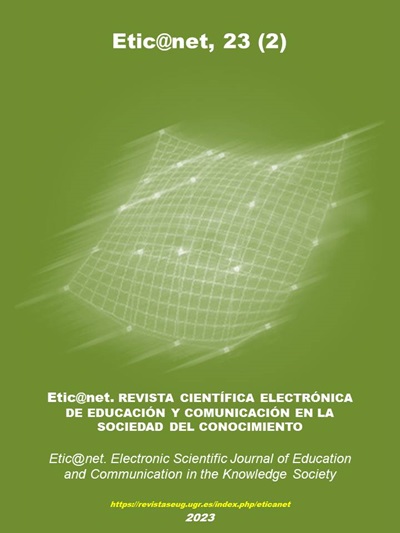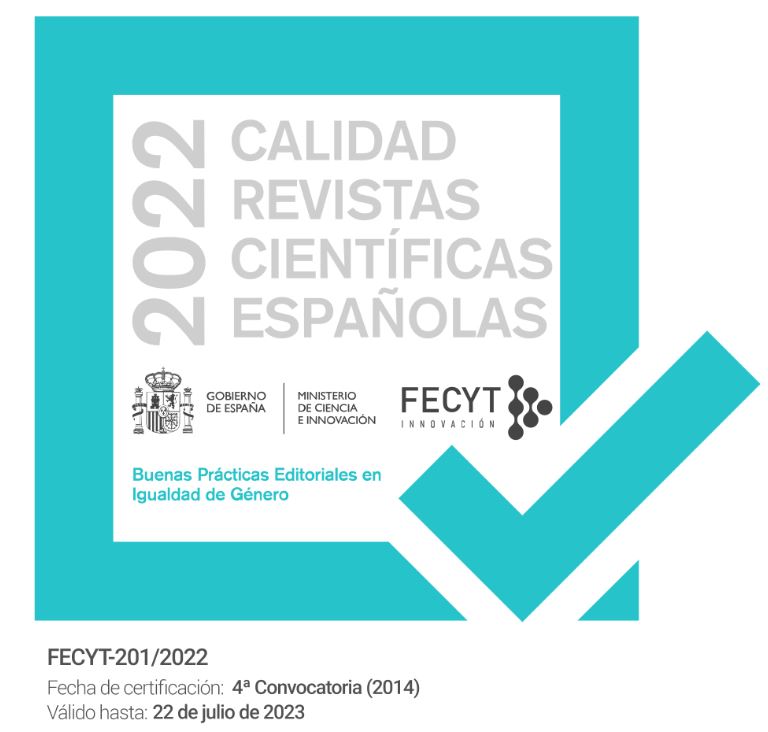Assessing the Impact of the COVID-19 Pandemic on the Transition from Baccalaureate to Higher Education: A Case Study
DOI:
https://doi.org/10.30827/eticanet.v23i2.28433Keywords:
rendimiento académico, pandemia COVID-19, transición educativa, educación superior, educación virtualAbstract
This case study assesses the transition of students who have completed their baccalaureate in virtual mode to a face-to-face higher education model in the post-pandemic era. The proposed hypothesis suggests that the rapid transformation to virtual education due to the COVID-19 pandemic has harmed students' learning and academic performance, resulting in a decline in educational quality. A mixed methodology combining quantitative and qualitative data collection techniques was employed. For this purpose, an online questionnaire was applied to collect quantitative data and was complemented by a focus group technique to obtain more detailed qualitative data. The results supported the hypothesis, and it was concluded that the lack of social and emotional skills and the low quality of education received in virtual education may have left students in a difficult situation to adapt to face-to-face education in higher education.
Downloads
References
Atweh, B., Kaur, B., Nivera, G., Abadi, A., & Thinwiangthong, S. (2023). Futures for Post-Pandemic Mathematics Teacher Education: responsiveness and responsibility in the Face of a Crisis. ZDM – Mathematics Education, 55(1), 65–77. https://doi.org/10.1007/s11858-022-01394-y
Ayoo, P. O. (2023). The impact of COVID-19 on higher education in Africa. En International Encyclopedia of Education(Fourth Edition) (pp. 91–101). Elsevier. https://doi.org/10.1016/B978-0-12-818630-5.02095-9
Benites, R. (2021). La Educación Superior Universitaria en el Perú post-pandemia. Políticas y debates públicos, 1(1), 1–11. https://repositorio.pucp.edu.pe/index/handle/123456789/176597
Bloor, M., Frankland, J., Thomas, M., & Robson, K. (2001). Focus Groups in Social Research. SAGE Publications Ltd. https://doi.org/10.4135/9781849209175
Bonal, X., & González, S. (2020). The impact of lockdown on the learning gap: family and school divisions in times of crisis. International Review of Education, 66(5–6), 635–655. https://doi.org/10.1007/s11159-020-09860-z
Cano Ibarra, S. T., De la Garza Carranza, M. T., González Farías, J. P., & Galván Morales, P. (2022). Percepción estudiantil universitaria de los cursos en línea implementados por contingencia covid-19. Un modelo de ecuaciones estructurales. RIDE Revista Iberoamericana para la Investigación y el Desarrollo Educativo, 12(24). https://doi.org/10.23913/ride.v12i24.1169
Daniel, S. J. (2020). Education and the COVID-19 pandemic. Prospects, 49(1–2), 91–96. https://doi.org/10.1007/s11125-020-09464-3
Dilemmas, W. E. (2021). Teaching in the Post COVID-19 Era. En Teaching in the Post COVID-19 Era. https://doi.org/10.1007/978-3-030-74088-7
Engelbrecht, J., Borba, M. C., & Kaiser, G. (2023). Will we ever teach mathematics again in the way we used to before the pandemic? ZDM – Mathematics Education, 55(1), 1–16. https://doi.org/10.1007/s11858-022-01460-5
Ferrer, J., Iglesias, E., Blanco-Gutiérrez, I., & Estavillo, J. (2023). Analyzing the impact of COVID-19 on the grades of university education: A case study with economics students. Social Sciences & Humanities Open, 7(1), 100428. https://doi.org/10.1016/j.ssaho.2023.100428
García-de-Paz, S., & Santana Bonilla, P. J. (2021). Transición a entornos de educación virtual en un contexto de emergencia sanitaria. Revista de Educación a Distancia (RED), 21(65), 8–9. https://doi.org/10.6018/red.450791
González-Moreira, A., Ferreira, C., & Vidal, J. (2023). Review on Research Methods for Studying Transition from Early Childhood Education to Primary Education. Education Sciences, 13(3), 254. https://doi.org/10.3390/educsci13030254
Greenbaum, T. (1998). The Handbook for Focus Group Research (Second Edi). SAGE Publications, Inc. https://doi.org/10.4135/9781412986151
Jandrić, P., Martinez, A. F., Reitz, C., Jackson, L., Grauslund, D., Hayes, D., Lukoko, H. O., Hogan, M., Mozelius, P., Arantes, J. A., Levinson, P., Ozoliņš, J. J., Kirylo, J. D., Carr, P. R., Hood, N., Tesar, M., Sturm, S., Abegglen, S., Burns, T., … Hayes, S. (2022). Teaching in the Age of Covid-19—The New Normal. En Postdigital Science and Education (Vol. 4, Número 3). Springer International Publishing. https://doi.org/10.1007/s42438-022-00332-1
Lanphier, T. S., & Carini, R. M. (2022). A Process Evaluation of a Learning Community Program: Implemented as Designed? Education Sciences, 12(1), 60. https://doi.org/10.3390/educsci12010060
Liebendörfer, M., Kempen, L., & Schukajlow, S. (2023). First-year university students’ self-regulated learning during the COVID-19 pandemic: a qualitative longitudinal study. ZDM – Mathematics Education, 55(1), 119–131. https://doi.org/10.1007/s11858-022-01444-5
López-Aguilar, D., Álvarez-Pérez, P. R., & Ravelo-González, Y. (2022). Capacidad de adaptabilidad e intención de abandono académico en estudiantes universitarios. Revista de Investigación Educativa, 40(1), 237–255. https://doi.org/10.6018/rie.463811
Lytras, M. D., Serban, A. C., Ruiz, M. J. T., Ntanos, S., & Sarirete, A. (2022). Translating knowledge into innovation capability: An exploratory study investigating the perceptions on distance learning in higher education during the COVID-19 pandemic - the case of Mexico. Journal of Innovation & Knowledge, 7(4), 100258. https://doi.org/10.1016/j.jik.2022.100258
Mahajan, R., Lim, W. M., Kumar, S., & Sareen, M. (2023). COVID-19 and management education: From pandemic to endemic. The International Journal of Management Education, 100801. https://doi.org/10.1016/j.ijme.2023.100801
Mohammadzadeh, N., Vajargah, K. T., Nilforoushan, N., Ashouri, M., Jafarian, A., & Emami-Razavi, S. H. (2022). The impact of the COVID-19 pandemic on surgical education: A survey and narrative review. Annals of Medicine & Surgery, 82, 6. https://doi.org/10.1016/j.amsu.2022.104598
Noori, A. Q. (2021). The impact of COVID-19 pandemic on students’ learning in higher education in Afghanistan. Heliyon, 7(10), e08113. https://doi.org/10.1016/j.heliyon.2021.e08113
Rivadeneira, J., & Inga, E. (2023). Interactive Peer Instruction Method Applied to Classroom Environments Considering a Learning Engineering Approach to Innovate the Teaching–Learning Process. Education Sciences, 13(3), 301. https://doi.org/10.3390/educsci13030301
Segovia-García, N., Said-Hung, E., & Aguilera, F. J. G. (2022). Virtual higher education in Colombia: Factors associated with dropping out. Educacion XX1, 25(1), 197–218. https://doi.org/10.5944/educxx1.30455
Stecuła, K., & Wolniak, R. (2022). Advantages and Disadvantages of E-Learning Innovations during COVID-19 Pandemic in Higher Education in Poland. Journal of Open Innovation: Technology, Market, and Complexity, 8(3), 159. https://doi.org/10.3390/joitmc8030159
UNESCO. (2022). The impact of the COVID-19 pandemic on education International evidence from the Responses to Educational Disruption Survey (REDS) (S. Meinck, J. Fraillon, & R. Strietholt (eds.)). http://www.unesco.org/open-access/terms-use-ccbysa-en
Villa-Ochoa, J. A., Molina-Toro, J. F., & Borba, M. C. (2023). Roles of technologies for future teaching in a pandemic: activity, agency, and humans-with-media. ZDM – Mathematics Education, 55(1), 207–220. https://doi.org/10.1007/s11858-022-01429-4
Wang, D., Adedokun, O. A., Millogo, O., Madzorera, I., Hemler, E. C., Workneh, F., Mapendo, F., Lankoande, B., Ismail, A., Chukwu, A., Assefa, N., Abubakari, S. W., Lyatuu, I., Okpara, D., Abdullahi, Y. Y., Zabre, P., Vuai, S., Soura, A. B., Smith, E. R., … Fawzi, W. W. (2022). The Continued Impacts of the COVID-19 Pandemic on Education and Mental Health Among Sub-Saharan African Adolescents. Journal of Adolescent Health, 1–9. https://doi.org/10.1016/j.jadohealth.2022.11.012
Downloads
Published
Issue
Section
License
The authors who publish in this journal agree to the following terms: The authors retain the copyright and grant the journal the right to be the first publication of the work as well as licensed under a Creative Commons Attribution License that allows others to share the work with an acknowledgment of the authorship of the work and the initial publication in this magazine. Authors are allowed and encouraged to disseminate their work electronically (for example, in institutional repositories or on their own website) before and during the submission process, as it may lead to productive exchanges as well as further citation. Earliest and greatest of published works (See The Effect of Open Access).













